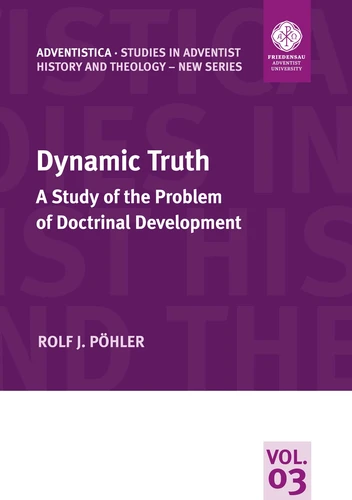Dynamic Truth. A Study of the Problem of Doctrinal Development
Par :Formats :
Disponible dans votre compte client Decitre ou Furet du Nord dès validation de votre commande. Le format ePub est :
- Compatible avec une lecture sur My Vivlio (smartphone, tablette, ordinateur)
- Compatible avec une lecture sur liseuses Vivlio
- Pour les liseuses autres que Vivlio, vous devez utiliser le logiciel Adobe Digital Edition. Non compatible avec la lecture sur les liseuses Kindle, Remarkable et Sony
 , qui est-ce ?
, qui est-ce ?Notre partenaire de plateforme de lecture numérique où vous retrouverez l'ensemble de vos ebooks gratuitement
Pour en savoir plus sur nos ebooks, consultez notre aide en ligne ici
- Nombre de pages464
- FormatePub
- ISBN978-3-935480-55-0
- EAN9783935480550
- Date de parution16/09/2020
- Protection num.Digital Watermarking
- Taille642 Ko
- Infos supplémentairesepub
- ÉditeurTheologische Hochschule Friede
Résumé
DYNAMIC TRUTH is a reprint of the author's groundbreaking dissertation on Change in Seventh-day Adventist Theology. Submitted in 1995 and initially published in 1999 (Part I) and 2000 (Part II), it is the first and only in-depth study to date dealing with the issue of doctrinal development from an Adventist perspective.
Part I analyzes the intricate problem of doctrinal development and presents a historical survey of theories of doctrinal change, classifying them in three ideal types.
In the author's view, a dialectic approach concerned about substantial continuity as well as authentic change can best avoid the pitfalls of dogmatic immobilism and revisionism. Part II provides a detailed study of the problem of doctrinal change in a Seventh-day Adventist setting. It analyzes the extent, nature, and direction of doctrinal developments in the light of the religious background of the church and the social forces at work in it.
It also discusses the church's response to doctrinal adjustments and Ellen G. White's involvement in, and conception of, doctrinal change. The study concludes that Adventist teachings have been significantly affected by theological and hermeneutical developments under the impact of social forces nudging the church closer towards evangelical Protestantism. Ellen White, co-founder of the church, was personally involved in theological change.
Her concept of doctrinal development shows a remarkable depth of insight and presents a well-balanced approach to the dynamics of faith and truth.
In the author's view, a dialectic approach concerned about substantial continuity as well as authentic change can best avoid the pitfalls of dogmatic immobilism and revisionism. Part II provides a detailed study of the problem of doctrinal change in a Seventh-day Adventist setting. It analyzes the extent, nature, and direction of doctrinal developments in the light of the religious background of the church and the social forces at work in it.
It also discusses the church's response to doctrinal adjustments and Ellen G. White's involvement in, and conception of, doctrinal change. The study concludes that Adventist teachings have been significantly affected by theological and hermeneutical developments under the impact of social forces nudging the church closer towards evangelical Protestantism. Ellen White, co-founder of the church, was personally involved in theological change.
Her concept of doctrinal development shows a remarkable depth of insight and presents a well-balanced approach to the dynamics of faith and truth.
DYNAMIC TRUTH is a reprint of the author's groundbreaking dissertation on Change in Seventh-day Adventist Theology. Submitted in 1995 and initially published in 1999 (Part I) and 2000 (Part II), it is the first and only in-depth study to date dealing with the issue of doctrinal development from an Adventist perspective.
Part I analyzes the intricate problem of doctrinal development and presents a historical survey of theories of doctrinal change, classifying them in three ideal types.
In the author's view, a dialectic approach concerned about substantial continuity as well as authentic change can best avoid the pitfalls of dogmatic immobilism and revisionism. Part II provides a detailed study of the problem of doctrinal change in a Seventh-day Adventist setting. It analyzes the extent, nature, and direction of doctrinal developments in the light of the religious background of the church and the social forces at work in it.
It also discusses the church's response to doctrinal adjustments and Ellen G. White's involvement in, and conception of, doctrinal change. The study concludes that Adventist teachings have been significantly affected by theological and hermeneutical developments under the impact of social forces nudging the church closer towards evangelical Protestantism. Ellen White, co-founder of the church, was personally involved in theological change.
Her concept of doctrinal development shows a remarkable depth of insight and presents a well-balanced approach to the dynamics of faith and truth.
In the author's view, a dialectic approach concerned about substantial continuity as well as authentic change can best avoid the pitfalls of dogmatic immobilism and revisionism. Part II provides a detailed study of the problem of doctrinal change in a Seventh-day Adventist setting. It analyzes the extent, nature, and direction of doctrinal developments in the light of the religious background of the church and the social forces at work in it.
It also discusses the church's response to doctrinal adjustments and Ellen G. White's involvement in, and conception of, doctrinal change. The study concludes that Adventist teachings have been significantly affected by theological and hermeneutical developments under the impact of social forces nudging the church closer towards evangelical Protestantism. Ellen White, co-founder of the church, was personally involved in theological change.
Her concept of doctrinal development shows a remarkable depth of insight and presents a well-balanced approach to the dynamics of faith and truth.





